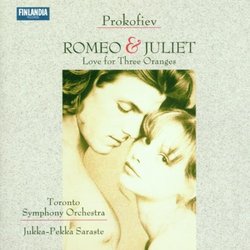| All Artists: Prokofiev, Saraste, Toronto Symphony Orchestra Title: Romeo & Juliet / Love for Three Oranges Members Wishing: 0 Total Copies: 0 Label: Finlandia Release Date: 3/17/1998 Genre: Classical Styles: Ballets & Dances, Ballets, Historical Periods, Modern, 20th, & 21st Century Number of Discs: 1 SwapaCD Credits: 1 Other Editions: Prokofiev: Romeo & Juliet / Lover for 3 Oranges UPC: 706301905029 |
Search - Prokofiev, Saraste, Toronto Symphony Orchestra :: Romeo & Juliet / Love for Three Oranges
 | Prokofiev, Saraste, Toronto Symphony Orchestra Romeo & Juliet / Love for Three Oranges Genre: Classical
|
Larger Image |
CD Details |
CD ReviewsA mix of good playing and fierce conducting Larry VanDeSande | Mason, Michigan United States | 06/30/2006 (3 out of 5 stars) "Jukka Pekka Saraste (apparently pronounced sah-rah-STAY) is not a name most people link to Prokofiev or anything Russian, for that matter. He is a largely unknown conductor even though his appointment as music director of the Toronto Symphony gave him the opportunity to make this unusual recording of Prokofiev's music.
Saraste and the Toronto Symphony librarian collaborated on this suite from "Romeo and Juliet" which they call a narrative of the ballet. It has 26 selections, more than Prokofiev's two suites contain between them. The 1996 recording, made in Toronto's hall, is lifelike, realistic, clear and deep. It is a very good recording for its period and presents both the music and the execution of the amended score in sound that leaves nothing to chance. The symphony orchestra plays well throughout, following the lead from its rambunctious conductor, who almost completely eschews balletic subtlety and gentleness. Charges that Prokofiev was a modernist without romantic intentions would be fulfilled on the basis of this rendition, which was not accepted well by the few critics that reviewed it. Classical Music Third Ear called the both the suite and interpretation weird and the most recent American Record Guide Prokofiev overview called Saraste's work "pedantic and boring." Don't they mean the same thing in critical terms? I'm not sure I can agree with either of these harsh reviews. I find I like this music the more I listen to it, something that's never happened before in the few suites from "Romeo and Juliet" I've owned by Ancerl and Neemi Jarvi, both of which have done much better worldwide with critics than this one. These comments lead me to believe some of the critics that dissed this recording perhaps did not really listen to it and merely copied the charges others leveled. Does such a thing happen in the classical music industry? There is a makeweight on the recording -- the orchestral suite to the opera "Love For the Three Oranges." This, too, is done without haste and without subtlety by Saraste, who comes off as a young man (he was 42 when he made this) with an edge about his work. So there's good and bad here. You'll hear an individual suite no one else has recorded that is much lengthier than most. But you won't hear every subtlety of the score; you may not hear any of them, in fact. It is universally well-played and recorded, so you'll hear everything just fine." |

 Track Listings (32) - Disc #1
Track Listings (32) - Disc #1